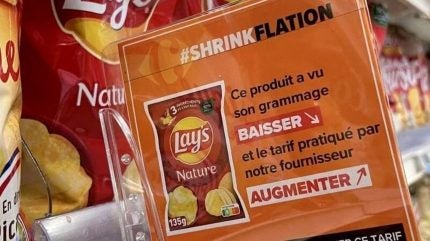
France’s government is making it mandatory for retailers in the country to identify which food and drink products have been affected by shrinkflation.
The decree, initiated by the Ministry of Economics, Finance and Industrial and Digital Sovereignty, will come into effect on 1 July.

Discover B2B Marketing That Performs
Combine business intelligence and editorial excellence to reach engaged professionals across 36 leading media platforms.
France submitted proposals for the decree to the EU at the start of this year.
Under the new law, “large and medium-sized stores”, like supermarkets, will be required to inform consumers about a product that has decreased in size through in-store signage.
The information “must appear” in these stores two months after the “marketing date” of the eligible products.
Pre-packaged foods will be exempt from the decree, the Ministry said.

US Tariffs are shifting - will you react or anticipate?
Don’t let policy changes catch you off guard. Stay proactive with real-time data and expert analysis.
By GlobalDataBruno Le Maire, France’s Minister of Economy, Finance and Recovery, said: “The practice of shrinkflation is a scam. We are putting an end to it. I want to restore consumer confidence. And with trust comes transparency.
“From 1 July, it will be mandatory to indicate when a food product changes size. The indication must in particular specify the evolution of the price in relation to weight, so that the consumer knows the true evolution of the price. We committed to it, we are doing it.”
Olivia Grégoire, Minister Delegate for Small Medium Enterprises, Trade, Crafts and Tourism, added: “This is an important step in the fight I am leading for the transparency that we owe to consumers.”
Some retailers have questioned the move, arguing manufacturers should be required to report on shrinkflation as opposed to the retailers.
In a post on X today (19 April), Dominique Schelcher, the CEO of Système U, said: “Shrinkflation is a trick used at the expense of consumers which must be combatted by systematically reporting it.
“But why ask it from distributors and not require it from manufacturers who decide to use it and who have all the necessary data? This is truly incomprehensible in these times of desire for simplification.”
In a separate post, Schelcher added: “I have just spoken just now with a manufacturer who himself recognises that it will be complicated for distributors to communicate on re-inflation because it will be extremely complex to have the right information. I fear an obligation that is difficult to implement for the teams, which we do not need at the moment.”
Earlier this week, French non-profit Foodwatch took aim at brands for “cheapflation” – when ingredients are reduced or replaced for cheaper ones.
Foodwatch’s analysis found French meats supplier Fleury Michon, chicken group LDC and US dairy brand Siggi’s have all “changed their recipes on the sly”.
While Fleury Michon cut the amount of pork ham in its 100% pork ham mince product, LDC reduced the quantity of chicken and cheese in its Le Gaulois Cordon Bleu, Foodwatch said.
The price of Siggi’s vanilla-flavoured Skyr yogurt per kilo was found to have gone up 13%.
All three brands “confirmed these changes”, said Foodwatch.
The new legislation follows on from the pricing row between food and drink heavyweight PepsiCo and European retail major Carrefour in January.
This led to the Paris-headquartered supermarket removing PepsiCo snacks and beverages from its shelves across Europe.
It also installed banners next to the empty shelves, indicating they had stopped stocking its products “due to an unacceptable price increase”.
At the beginning of April, it was reported the companies had resolved the spat.





